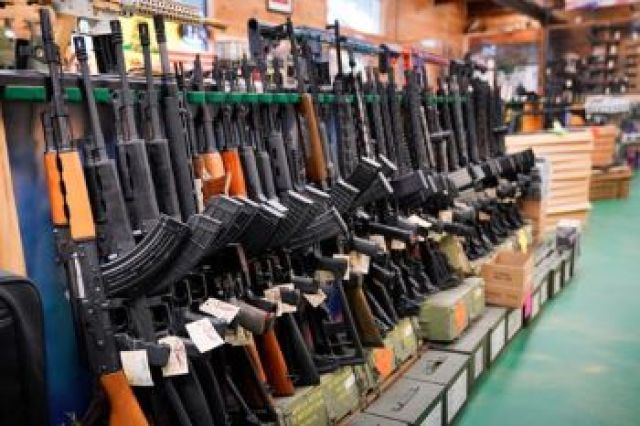A total of 26 Republican states filed three separate lawsuits against the Bureau of Alcohol, Tobacco, Firearms and Explosives, the U.S. Department of Justice, and the corresponding leaders, over The Regime’s new gun-control rule that will regulate the private selling and purchasing of firearms.
Each federal lawsuit, filed Wednesday, argues the ATF rule violates the Second Amendment by placing undue gun restrictions on American citizens.
According to the rule:
[A]ny person who sells a gun for profit to anyone else, including family members, would be considered “engaged in the business” of dealing in firearms.
Therefore, a private seller would be required to obtain a federal firearms license and conduct a background check before making a transaction. Those who violate the rule’s provisions would be considered felons.
Kansas attorney general Kris Kobach and Texas attorney general Ken Paxton led two multistate lawsuits, while Florida attorney general Ashley Moody filed her own.
The Kansas-led court filing reads:
Until now, those who repetitively purchased and sold firearms as a regular course of business had to become a licensee.
This rule would put innocent firearm sales between law-abiding friends and family members within reach of federal regulation.
Further:
Such innocent sales between friends and family would constitute a felony if the seller did not in fact obtain a federal firearms license and perform a background check.
In all three lawsuits, the listed Republican attorneys general argue the rule is unconstitutional because it circumvents Congress.
In 2022, Congress passed the Bipartisan Safer Communities Act to, in part, expand the background-check system for gun sellers.
[Joe Biden] signed the gun-control legislation into law to crack down on gun violence in the U.S. and has since called for Congress to pass stricter legislation requiring universal background checks.
Congress has repeatedly declined to do so, but Biden signed an executive order last year directing U.S. attorney general Merrick Garland to move as close to universal background checks as possible.
This resulted in the creation of the ATF rule, which expands upon the Bipartisan Safer Communities Act’s modified definition of ‘engaged in the business’ of selling guns, meaning anyone can be classified as a firearms dealer if they have the intent to ‘predominantly earn a profit.’
The lawsuits say this updated definition extends beyond the scope of the Bipartisan Safer Communities Act, which exempts individuals who occasionally engage in firearm transactions.
The Florida’s suit states:
The challenged rule, in fact, goes far beyond the plain text of the BSCA.
It purports to force thousands of law-abiding gun owners to register as federal firearms dealers and navigate a federal bureaucracy as a precondition to engaging in constitutionally protected activity.
Last month, the DOJ submitted the final version of the rule, “Definition of ‘Engaged in the Business’ as a Dealer in Firearms,” to the Federal Register. The final rule was published in the Federal Register on April 19 and will go into effect on May 20.
The Texas-led lawsuit states:
This Court’s action is necessary on an urgent basis because, contrary to past practice, Defendants have accelerated the effective date of their latest edict to a mere 30 days from publication in the Federal Register, in an attempt to circumvent timely judicial review.
All 26 states urge the courts to rule that the ATF rule is unlawful and permanently enjoin the defendants from implementing it.
Kansas was joined by 20 other states: Arkansas, Iowa, Montana, Alabama, Alaska, Georgia, Idaho, Indiana, Kentucky, Missouri, Nebraska, New Hampshire, North Dakota, Oklahoma, South Carolina, South Dakota, Tennessee, Virginia, West Virginia, and Wyoming.
The Texas coalition includes Louisiana, Mississippi, and Utah.
Gun-rights advocacy groups representing gun owners serve as co-plaintiffs in the suits filed by Kansas and Texas, and Florida was the sole plaintiff in its own litigation against the ATF, DOJ, and their heads.
God speed to all 26 states with their lawsuits.





